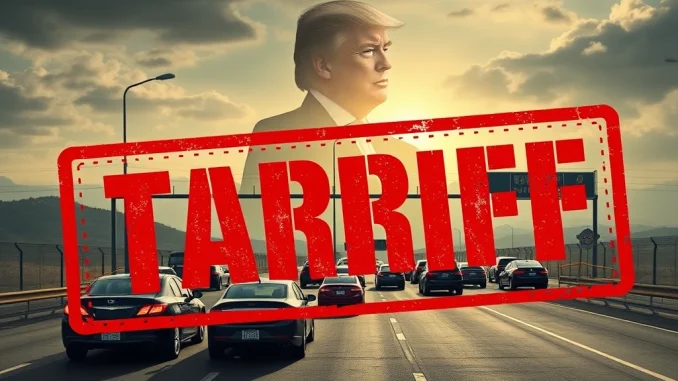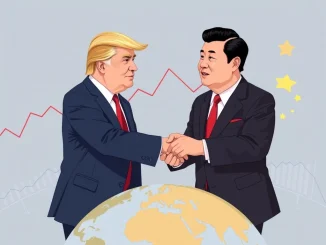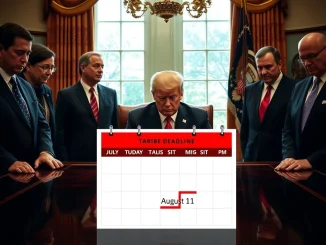
Get ready for a potential economic earthquake! In a move that has sent shockwaves through the global automotive industry and beyond, former President Donald Trump has reportedly announced a significant escalation in trade tensions. While we primarily focus on the fast-paced world of crypto and blockchain here, events like these in traditional finance can have ripple effects across all markets, including digital assets. Let’s dive into the details of this developing story.
What’s the Shocking News on Car Tariffs?
According to a report by Bloomberg, highlighted by the prominent crypto news source Wu Blockchain on X (formerly Twitter), Donald Trump has declared a hefty 25% tariff on all vehicles manufactured outside the United States. This isn’t just a minor tweak; it’s a substantial increase that could dramatically reshape the automotive landscape. Let’s break down the key points:
- Effective Date: The new car tariffs are slated to take effect on April 2nd.
- Enforcement Date: Enforcement will begin swiftly on April 3rd.
- Tariff Rate: A significant 25% will be levied on top of the existing 2.5% import duty on cars.
- Exemption: There’s a slight silver lining – U.S.-made parts used in vehicles assembled abroad will be exempt from these new auto tariffs.
This announcement, if confirmed, represents a major policy shift and a potential return to the aggressive trade tactics that defined the Trump administration’s approach to international commerce.
Why are These Trump Tariffs Considered a Big Deal?
To understand the magnitude of this potential policy, we need to consider the broader context. Trump tariffs on imported goods were a hallmark of his presidency, often justified as a means to protect American industries and jobs. However, these measures frequently drew criticism and sparked retaliatory actions from other countries, leading to what many economists termed a ‘trade war’.
The automotive industry is a massive global sector. Imposing a 25% tariff on foreign-made cars could have far-reaching consequences:
| Potential Impacts of 25% Car Tariffs | Details |
| Increased Car Prices for US Consumers | Imported cars will become significantly more expensive, potentially leading to higher prices for all cars as domestic manufacturers adjust pricing. |
| Impact on Foreign Automakers | Companies that export cars to the US will face a major competitive disadvantage, potentially impacting their sales and profitability. |
| Retaliatory Tariffs from Other Countries | Other nations may respond by imposing their own tariffs on US goods, escalating trade tensions further. |
| Disruption to Global Supply Chains | The automotive industry relies on complex global supply chains. Tariffs can disrupt these chains, leading to inefficiencies and higher costs. |
| Potential Job Losses (Paradoxically) | While intended to protect US jobs, tariffs can lead to job losses in industries that rely on imported components or export goods that face retaliatory tariffs. |
How Could This Trade War Affect the Global Economy?
The interconnected nature of the modern global economy means that trade disputes in one sector can quickly spread and have wider implications. Escalating trade wars create uncertainty and instability, which can negatively impact investor confidence and economic growth. Here’s how this situation could play out on a larger scale:
- Reduced Global Trade: Higher tariffs act as barriers to trade, reducing the flow of goods and services between countries.
- Slower Economic Growth: Trade wars can dampen economic growth by increasing costs for businesses and consumers, and by creating uncertainty that discourages investment.
- Inflationary Pressures: Tariffs can contribute to inflation by making imported goods more expensive, which can then ripple through the economy.
- Market Volatility: Uncertainty surrounding trade policy can lead to increased volatility in financial markets, including stock markets and potentially even cryptocurrency markets, as investors react to shifting economic landscapes.
What Does This Mean for Crypto and the Digital Asset Space?
While seemingly unrelated to the world of Bitcoin, Ethereum, and blockchain, major shifts in the global economy do have implications for the crypto space. Here’s how:
- Risk-Off Sentiment: Increased global economic uncertainty can lead to a ‘risk-off’ sentiment in financial markets. Investors may become more cautious and move away from riskier assets, which can sometimes include cryptocurrencies.
- Inflation Hedge Narrative: Conversely, in an inflationary environment potentially exacerbated by tariffs, some investors may turn to cryptocurrencies like Bitcoin as a hedge against inflation, seeing them as alternative stores of value.
- Broader Market Impact: If traditional markets experience significant volatility due to trade tensions, this can indirectly affect the crypto market, as both are part of the larger financial ecosystem.
- Geopolitical Uncertainty: Trade wars are often a symptom of broader geopolitical tensions. Increased global instability can sometimes drive interest in decentralized and borderless assets like cryptocurrencies.
Navigating the Uncertainties of Car Tariffs
It’s crucial to remember that this is still a developing story based on reports. Official confirmation and further details are needed to fully assess the situation and its potential impact. However, the announcement of these significant auto tariffs serves as a stark reminder of the interconnectedness of the global economy and the potential for rapid shifts in trade policy to create widespread uncertainty.
As cryptocurrency enthusiasts and participants in the global financial landscape, staying informed about these broader economic trends is essential. Events like these underscore the importance of understanding how traditional finance and geopolitics can influence the digital asset space. We will continue to monitor this story and provide updates as they become available.
Stay tuned for more developments and in-depth analysis as this story unfolds. The potential impact of these car tariffs on the global economy and, indirectly, on the cryptocurrency markets, is something we will be closely watching.



